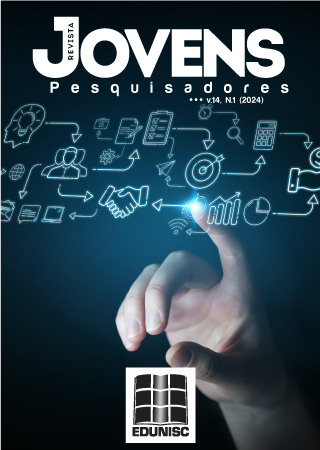USE OF SOCIAL MEDIA AS A DIDACTIC RESOURCE: AN EXPERIENCE REPORT ON IMMUNOLOGY TUTORING
DOI:
https://doi.org/10.17058/rjp.v14i1.19287Keywords:
Tutoring, Learning, Use of Social Media, ImmunologyAbstract
Academic tutoring is essential in the academic environment as it provides students with the opportunity to review and consolidate the knowledge acquired in the classroom, while monitors develop communication and collaboration skills while fulfilling their duties. In this context, the Immunology monitoring program at the University of Santa Cruz do Sul created a profile on the Instagram platform with the aim of disseminating knowledge in new digital spaces and further enhancing communication between students and monitors. In light of this, the present study aimed to report on the results obtained from using Instagram as a complementary learning resource. This is an experiential report from the Immunology monitoring program during the academic semesters of 2023. The use of social media as a teaching tool increased visibility and engagement for the proposed monitoring activities, reaching an audience beyond the academic community. Concerning the followers of the profile, 75% identified as female and 25% as male. Regarding age range, 49% of the followers are between 18 and 24 years old. As for the region where they accessed the content, 73.61% of the followers did so in the city of Santa Cruz do Sul. Tutoring has proven to be effective in its role, by disseminating knowledge in a dynamic and differentiated manner, while also providing tutors the opportunity to develop digital communication skills.
Downloads
References
ASSIS, Fernanda de; et al. Programa de Monitoria Acadêmica: percepções de monitores e orientadores. Revista Enfermagem UERJ, 2006. Disponível em: http://www.revenf.bvs.br/pdf/reuerj/v14n3/v14n3a10.pdf. Acesso em: 07 mar. de 2024.
BRASIL. Decreto Lei BR n° 5.540, de 28 de novembro de 1968. Fixa normas de organização e funcionamento do ensino superior e sua articulação com a escola média. Disponível:http://www.planalto.gov.br/ccivl_03/Leis/>5540.htm. Acesso em:18 fev. de 2024.
BOTELHO, L. V.; LOURENÇO, A. E. P.; LACERDA, M. G.; WOLLZ, L. E. B. Monitoria acadêmica e formação profissional em saúde: uma revisão integrativa. ABCS Health Sciencies, Macaé, v.44, n. 01, p.67-74, 2019. Disponível em: https://www.portalnepas.org.br/abcshs/article/view/1140/836. Acesso em: 05 mar. 2024.
CANDAU, Vera. Maria. F. A didática em questão e a formação de educadores-exaltação à negação: a busca da relevância. In: CANDAU, Vera. Maria. F. (org). A didática em questão. Petrópolis: Vozes, 2012
CASTAÑEDA, Linda Quintero. Aprendizaje con redes sociales : Tejidos educativos para los nuevos entornos. Sevilla: Editorial Mad SL , 2010.
ET SERAFINI, T. M.; EM, T. M. Integration of Education: Using Social Media Networks to Engage Students Risa Blair, EdD Information Systems, Kaplan University Miami Shores, FL 33150/ET, USA and Tina M. Em: DsC Composition. Systemics, Cybernetics And Informatics, v. 12, 2014. Disponível em: http://iiisci.org/Journal/CV$/sci/pdfs/HA312LG14.pdf. Acesso em: 08 mar. 2024
FARIAS, Paulo V. B. DE; COELHO, Maria T. B. F. Contribuições da monitoria ao uso de metodologias ativas na formação de educadores/ Monitoring contributions to the use of active methodologies in educator training. Brazilian Journal of Development, 2021. Disponível em: https://ojs.brazilianjournals.com.br/ojs/index.php/BRJD/article/view/23492. Acesso em: 20 fev 2024.
GARCIA, Luciane Terra dos Santos; FILHO, Luiz Gomes da Silva; SILVA, Maria Verônica Gomes da. Monitoria e avaliação formativa em nível universitário: desafios e conquistas. Perspectiva, 2013. Disponível em: https://periodicos.ufsc.br/index.php/perspectiva/article/view/2175-795X.2013v31n3p973/27746. Acesso em: 14 fev. 2024.
KENSKI, Vani Moreira. Educação e Tecnologias: o novo ritmo da informação. 8ª ed. Campinas, SP: Papirus, 2012.
MARTINELLI, C. T.; BEATRICI, A. F. A metodologia da monitoria acadêmica e um novo olhar sobre a aprendizagem – o que temos a dizer sobre esta experiência. Redin - Revista Educacional Interdisciplinar, 2018. Disponível em: https://seer.faccat.br/index.php/redin/article/view/1088. Acesso em: 05 mar. 2024.
MATTAR, João. Web 2.0 e redes sociais na educação. São Paulo: Artesanato Educacional, 2013.
NATÁRIO, E. G.; SANTOS, A. A. A. Dos. Programa de monitores para o ensino superior. Estudos de Psicologia (Campinas), 2010. Disponível em: https://www.scielo.br/j/estpsi/a/VNy8x9W5st93VFJ7Lcs9RjP/abstract/?lang=pt. Acesso em: 10 mar. 2024.
SILVA, I. S.; SILVA, R. P. M. A importância da monitoria no processo ensino-aprendizagem dos alunos de medicina da Universidade Federal do Acre. Revista Foco, 2023. Disponível em: https://ojs.focopublicacoes.com.br/foco/article/view/3374. Acesso em: 08 mar. 2024.
SOUZA, M. V.; GIGLIO, K. Mídias digitais, redes sociais e educação em rede. São Paulo: Edgard Blucher, 2015.
VIEIRA, R. S. O Papel das tecnologias da informação e comunicação na educação a distância: um estudo sobre a percepção do professor/tutor. Revista Brasileira De Aprendizagem Aberta E a Distância, 2010. Disponível em: https://seer.abed.net.br/RBAAD/article/view/233. Acesso em: 08 mar. 2024.
Valente, J. A.. Comunicação e a educação baseada no uso das tecnologias digitais de informação e comunicação. UNIFESO - Humanas e Sociais, 2014. Disponível em: https://revista.unifeso.edu.br/index.php/revistaunifesohumanasesociais/article/view/17. Acesso em: 04 mar. 2024.
Downloads
Published
How to Cite
Issue
Section
License
A submissão de originais para este periódico implica na transferência, pelos autores, dos direitos de publicação impressa e digital. Os direitos autorais para os artigos publicados são do autor, com direitos do periódico sobre a primeira publicação. Os autores somente poderão utilizar os mesmos resultados em outras publicações indicando claramente este periódico como o meio da publicação original. Em virtude de sermos um periódico de acesso aberto, permite-se o uso gratuito dos artigos em aplicações educacionais e científicas desde que citada a fonte conforme a licença CC-BY da Creative Commons. Creative Commons Atribuição 4.0 Internacional.
Creative Commons Atribuição 4.0 Internacional.


